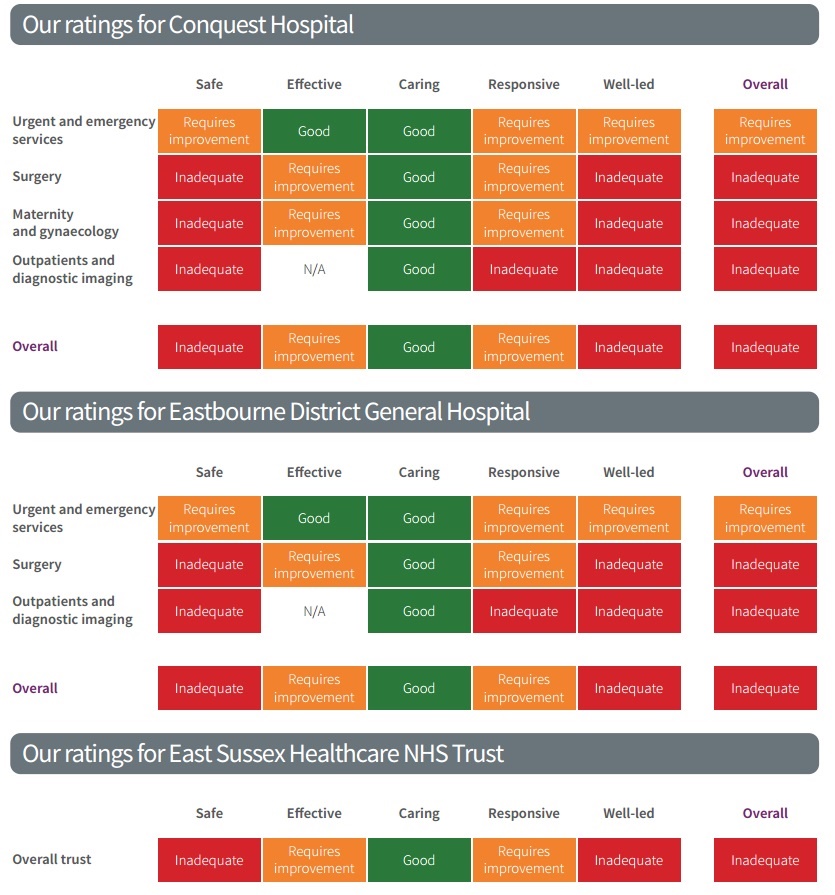23.09.15
East Sussex put in special measures after concerns of bullying culture
East Sussex Healthcare NHS Trust has been placed in special measures after CQC inspectors found a “void” between the out-of-touch trust board and its staff, who were working in a “culture of fear” and not speaking out to voice their concerns.
The CQC report, published yesterday (22 September), found a gap between board perception and the reality of working at the trust. Senior managers and executives spoke “entirely positively” and claimed most staff were “on board” despite a few “dissenters”. This “widespread disconnect” between the board and its staff had persisted since the previous inspection report in March.
Staff also remained afraid to speak out or share concerns openly, an aspect also reported in the last inspection. Several sources told inspectors about the detriment staff had suffered when raising concerns about patient safety, suggesting a culture of bullying in the trust. Employees were also concerned when contacting CQC about this information.
The trust continued to ignore the need for a direct programme to address staff engagement, with even community stakeholders holding poor relationships with the board. Senior staff at management and executive level lacked a “credible strategy” for effective engagement to improve damaged relationships.
The chief inspector of hospitals, Sir Mike Richards, said: “It is clear from our most recent inspection that [the trust] has been struggling to deal with deep-rooted problems which have been having an impact on its core services. I am disappointed that the trust has made too little progress in dealing with the significant issues in the underlying culture which have been all too apparent for some time.
“While I recognise that the trust has been working over the last few months to make further improvements, I am chiefly concerned at the rate of progress since our inspection last year. The continuing disconnect between the trust board and staff is worrying, and I am sure lies behind the continuing poor performance.”
The trust, which was only rated ‘good’ for the ‘caring’ category, was performing badly in most areas during the inspection – with reportedly “below average” levels for 23 of the 29 measures recorded, and in the bottom 20% for 18 measures.
Although local managers had taken some steps to improve patient experience in outpatient areas, there remained long delays in referrals and treatment. Patients were not being seen for follow-up appointments within the timeframe requested by the clinician, and the call centre for outpatient appointments was ineffective. Clinics were also sometimes cancelled without patients being informed of it, or told within a very short notice.
There was no cycle of improvement and learning based on the outcome of risk or incidents and staff were not convinced of the benefit of reporting incidents – thus causing them not to do so.
Responding to the findings, Richard Sunley, acting chief executive at the trust, said: “We are very disappointed about the shortfalls the CQC has identified. We are sorry that we have let down people who use our services, our staff and colleagues and acknowledge we have not delivered the standards the people in East Sussex rightly expect from us.
“However, we welcome the additional support from the wider NHS that the CQC has recommended and are determined to make a new start. We are working hard to meet our ambitions to improve at pace and deliver excellence for the people we serve.”

Other concerns spanned nearly all areas of the trust, including reports of understaffing, inaccurate data provided to external stakeholders, lack of privacy, inadequate record tracking, unacceptable medical and nursing training, and worrying management of medicine and pharmacy services.
One good area of practice concerned the telephone triage system, which provided a high standard of information, guidance and support to women.
The CQC outlined 12 main areas the trust must improve, including considering how it will rebuild effective relationships with staff and stakeholders, especially by creating an “organisational culture” underpinned by openness and safety.
Richards added: “I am aware of the renewed determination by the new senior managers to take more robust and focused action. Despite these assurances, I do not feel the improvements we have seen are nearly enough to put to rest the concerns of the people who use the services or local stakeholders.
“We will continue to monitor the trust’s performance closely. I am hopeful that when we return in the future to check again, we will find evidence of significant changes for the benefit of all those who depend on its services.”